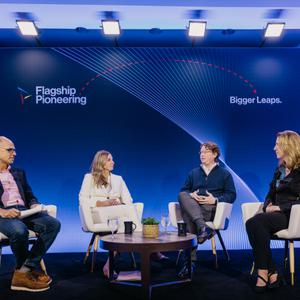Listen to Gary Pisano, Flagship Academic Partner and Harry E. Figgie Jr. Professor of Business Administration at Harvard Business School, to learn the mistakes that can keep companies from growing profitably, the lessons a fast food chain and a cave rescue serve up about growth and innovation, and why he no longer thinks organizations need to be simple to thrive.
Introducing Gary Pisano, Flagship Academic Partner
Liz Pavone, Manager of Content and Science Communications at Flagship introduces Gary Pisano, a Harvard Business School professor and Academic Partner at Flagship where he is currently spending his sabbatical. Gary shares more about his work over the last nearly 40 years researching innovation and organizational structure, especially in life sciences and biotech firms. Gary's interests have led him to also study issues related to strategy, organization, growth, and a company culture's role in innovation.
What mistakes are preventing companies from profitable growth?
Gary discusses his recent article in Harvard Business Review "" and warns about the potential pitfalls of pursuing rapid and unsustainable growth. He observes that many companies overlook crucial factors such as resources, company culture, and supply chain capacities when setting their growth targets. Hear about the dangers of quick fixes and the need for sustainable, realistic growth strategies to avoid reactive business practices.
What are the benefits of partnership as a method of growth, and why has partnership predominated in the biotech industry?
Gary discusses the crucial role of partnerships in business growth, especially in the biotech industry. He highlights how partnerships have been integral in the biotech sector from the beginning and have allowed companies to leverage unique capabilities of partners while concentrating on their specialties. He also advises that these partnerships can be complex and require extensive integration and dedication.¬Ý
How should early-stage biotechs think about growth?
Gary discusses growth strategies for small biotech firms and the risks involved.¬ÝHe notes strategies used by successful biotech firms that leverage partnerships for early-stage funding before transitioning to vertical integration. Gary shares examples, such as Genzyme, a company that pursued a unique avenue that pushed them to manage their value chain independently.
What lessons can biotech learn from a fast-food chain described in your HBR article?
Gary Pisano discusses how Pal's, a fast-food chain, approaches growth and how biotech can learn from this model. Hear how Pal's¬Ýapproach ensures quality and efficiency in operations through skilled management and signifies the importance of the right talent, which is well-rewarded and supported by data. Gary¬Ýadvocates for resources, both financial and human and emphasizes the importance of continuous investment in talent development.¬Ý
How are you spending your sabbatical at Flagship, and what are your early reflections and learnings?
Gary discusses his sabbatical experience at Flagship and how he has been contributing his expertise¬Ýin non-scientific areas such as partnerships, business models, strategies, and organizational capital development.
What have you learned about AI thus far and how do you see it impacting organizations?
Gary shares what¬Ýhe has¬Ýbeen learning about artificial intelligence, its role at Flagship and Flagship-founded companies, and how it can be used to help us better understand organizations.
What is your favorite Flagship mindset and do you see examples of it outside of Flagship?
During his sabbatical at Flagship, Gary explores the organization's complex dynamics, viewing chaos as a necessary part of “emergence.” He questions the idea that organizations need to be simple and discusses the importance of balanced complexity to ensure flexibility and agility that can facilitate discovery and evolution as opposed to maintaining an idealized structure.
If you see an error in this story, contact us.





